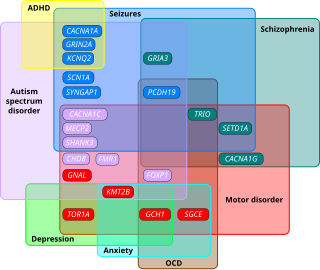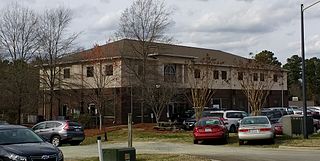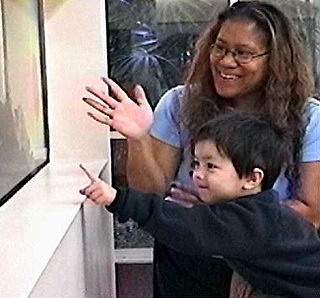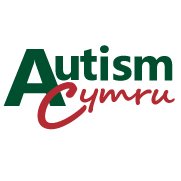Related Research Articles

Asperger syndrome (AS), also known as Asperger's syndrome or Asperger's, is a term formerly used to describe a neurodevelopmental condition characterized by significant difficulties in social interaction and nonverbal communication, along with restricted, repetitive patterns of behavior and interests. Asperger syndrome has been merged with other conditions into autism spectrum disorder (ASD) and is no longer considered a diagnosis. It was considered milder than other diagnoses which were merged into ASD due to relatively unimpaired spoken language and intelligence.

Diagnoses of autism have become more frequent since the 1980s, which has led to various controversies about both the cause of autism and the nature of the diagnoses themselves. Whether autism has mainly a genetic or developmental cause, and the degree of coincidence between autism and intellectual disability, are all matters of current scientific controversy as well as inquiry. There is also more sociopolitical debate as to whether autism should be considered a disability on its own.

Autism spectrum disorder (ASD) is a neurodevelopmental disorder that begins in early childhood, persists throughout adulthood, and affects two crucial areas of development: social communication and restricted, repetitive patterns of behavior. There are many conditions comorbid to autism spectrum disorder such as attention-deficit hyperactivity disorder and epilepsy.
The following outline is provided as an overview of and topical guide to autism:

The University of North Carolina TEACCH Autism Program creates and disseminates community-based services, training programs, and research for individuals of all ages and skill levels with autism spectrum disorder (ASD), to enhance the quality of life for them and their families across the lifespan.

Autism Resource Centre (Singapore) or ARC(S) is a Singapore-based non-profit organisation established in 2000. It was established by professional and parent volunteers dedicated to serving children and adults with Autism Spectrum Disorder (ASD) to help them lead meaningful and independent lives.

Autism therapies include a wide variety of therapies that help people with autism, or their families. Such methods of therapy seek to aid autistic people in dealing with difficulties and increase their functional independence.
The epidemiology of autism is the study of the incidence and distribution of autism spectrum disorders (ASD). A 2022 systematic review of global prevalence of autism spectrum disorders found a median prevalence of 1% in children in studies published from 2012 to 2021, with a trend of increasing prevalence over time. However, the study's 1% figure may reflect an underestimate of prevalence in low- and middle-income countries.

Ari Daniel Ne'eman is an American disability rights activist and researcher who co-founded the Autistic Self Advocacy Network in 2006. On December 16, 2009, President Barack Obama announced that Ne'eman would be appointed to the National Council on Disability. After an anonymous hold was lifted, Ne'eman was unanimously confirmed by the United States Senate to serve on the Council on June 22, 2010. He chaired the council's Policy & Program Evaluation Committee making him the first autistic person to serve on the council. In 2015, Ne'eman left the National Council on Disability at the end of his second term. He currently serves as a consultant to the American Civil Liberties Union. As of 2019, he also is a Ph.D. candidate in Health Policy at Harvard University.
Interactive Autism Network (IAN) is a research registry which matches researchers and their studies to families who qualify to participate in and benefit from the research. The network closed to new participants in 2019. IAN facilitates ongoing research in autism spectrum disorders (ASDs). The goal is to accomplish research that advances understanding and treatment of ASDs. IAN was established in 2006 at the Kennedy Krieger Institute, and is funded by Autism Speaks and the Simons Foundation.
Autism, also called autism spectrum disorder (ASD) or autism spectrum condition (ASC), is a neurodevelopmental disorder characterized by symptoms of deficient reciprocal social communication and the presence of restricted, repetitive, and inflexible patterns of behavior that are impairing in multiple contexts and excessive or atypical to be developmentally and socioculturally inappropriate. Other common signs include difficulty with social interaction, verbal and nonverbal communication, along with perseverative interests, stereotypic body movements, rigid routines, and hyper- or hypo-reactivity to sensory input. Autism is clinically regarded as a spectrum disorder, meaning that it can manifest very differently in each person. For example, some are nonspeaking, while others have proficient spoken language. Because of this, there is wide variation in the support needs of people across the autism spectrum.
The Luke Priddis Foundation (LPF) is a charitable organisation established, in 2006, by rugby league player Luke Priddis, to help "maximise the services and opportunities available to Autistic and special needs children" and their families in the greater Sydney region.
Geraldine Dawson is an American child clinical psychologist, specializing in autism. She has conducted research on early detection, brain development, and treatment of autism spectrum disorders (ASD) and collaborated on studies of genetic risk factors in autism. Dawson is William Cleland Distinguished Professor of Psychiatry and Behavioral Sciences and professor of psychology and neuroscience, former director, Duke Institute for Brain Sciences and founding director of the Duke Center for Autism and Brain Development at Duke University Medical Center. Dawson was president of the International Society for Autism Research, a scientific and professional organization devoted to advancing knowledge about autism spectrum disorders. From 2008 to 2013, Dawson was research professor of psychiatry at the University of North Carolina at Chapel Hill and was chief science officer for Autism Speaks. Dawson also held the position of adjunct professor of psychiatry at Columbia University and is professor emerita of psychology at University of Washington. She is a fellow of the American Psychological Society, American Psychological Association, International Society for Autism Research, and the Society of Clinical Child and Adolescent Psychology.

Autism-friendly means being aware of social engagement and environmental factors affecting people on the autism spectrum, with modifications to communication methods and physical space to better suit individual's unique and special needs.

Autism Cymru was Wales' national charity for autism with offices in Cardiff, Wrexham, and Aberystwyth. The charity was established in May 2001 through an initial 3-year grant provided by The Shirley Foundation. The founder chair of the Trustees was Dame Stephanie Shirley of the Shirley Foundation.
Diagnosis, treatment, and experiences of autism varies globally. Although the diagnosis of autism is rising in post-industrial nations, diagnosis rates are much lower in developing nations.
Daniel H. Geschwind is an American physician-scientist whose laboratory has made pioneering discoveries in the biology of brain disorders and the genetic and genomic analyses of the nervous system. His laboratory showed that gene co-expression has a reproducible network structure that can be used to understand neurobiological mechanisms in health, evolution, and disease. He led the first studies to define the molecular pathology of autism spectrum disorder (ASD) and several other psychiatric disorders, and has made major contributions to defining the genetic basis of autism.
Discrimination against autistic people, also known as Autistiphobia, involves any form of discrimination, persecution, or oppression against people who are autistic. Discrimination against autistic people is a form of ableism.
The Interagency Autism Coordinating Committee (IACC) is a United States federal advisory panel within the Department of Health and Human Services (HHS). It coordinates all efforts within HHS concerning autism spectrum disorder (ASD).

Current research indicates that autistic people have higher rates of LGBT identities and feelings than the general population. A variety of explanations for this have been proposed, such as prenatal hormonal exposure, which has been linked with sexual orientation, gender dysphoria and autism. Alternatively, autistic people may be less reliant on social norms and thus are more open about their orientation or gender identity. A narrative review published in 2016 stated that while various hypotheses have been proposed for an association between autism and gender dysphoria, they lack strong evidence.
References
- 1 2 "The Daniel Jordan Fiddle Foundation, Inc." Business Name Search. New Jersey Division of Revenue and Enterprise Services. Retrieved February 27, 2016.
- 1 2 3 4 5 6 7 8 9 "Form of Organization Exempt from Income Tax". Daniel Jordan Fiddle Foundation, Inc. Guidestar. December 31, 2014.
- 1 2 "What now for autistic people no longer in school?". Miami Herald. May 3, 2016. Retrieved September 12, 2017.
- ↑ "Employees with autism shine at local car wash". Sun Sentinel . August 16, 2017. Retrieved September 12, 2017.